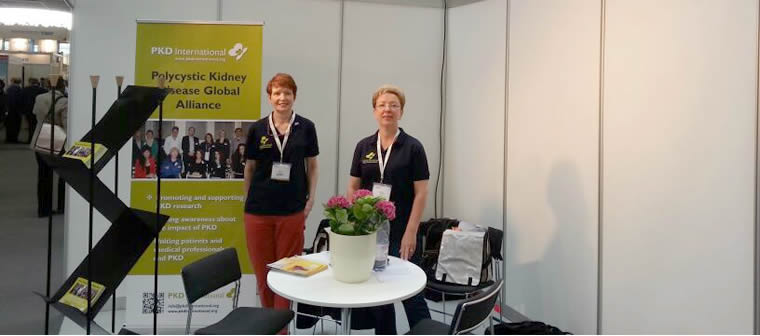Expert group formed to improve the management of ADPKD throughout Europe

London, UK, 31 May 2014 – Today marks the formation of the European ADPKD Forum (EAF), a new multidisciplinary group of leading medical and patient group experts dedicated to improving the health and quality of life of people with ADPKD – a progressive and chronic genetic kidney disease.

The EAF initiative, co-chaired by Tess Harris, President of PKD International, and Dr Richard Sandford, Consultant Clinical Geneticist at Addenbrooke’s Hospital, Cambridge aims to:
- Increase awareness of the impact of ADPKD on patients and health services
- Recommend strategies at the health policy level to improve ADPKD care, based on the latest scientific evidence and expert insight
- Encourage and facilitate collaboration between the individuals and groups involved in the management of people with ADPKD.
ADPKD is a progressive and chronic systemic disease, for which there are no approved therapies, formal care pathways or clinical guidelines.1, 2 The condition, which accounts for 10% of all patients in end stage renal failure, is characterised by the development and expansion of fluid-filled cysts in the kidney, leading to a substantial increase in total kidney volume.1, 3, 4 Patients commonly suffer from acute and chronic pain, and cysts can affect other organs, notably the liver.1, 3, 4 Ultimately, ADPKD leads to kidney failure in the majority of affected people; approximately 50% of ADPKD patients will reach ESRD by age 59 and 75% will reach ESRD by age 705.
As one of the most common inherited diseases, and the fourth leading cause of kidney failure, the condition represents a significant clinical and economic challenge to healthcare professionals and services throughout Europe.6-9
Commenting on the formation of the EAF, Tess Harris said: “ADPKD places a great emotional and physical strain on people with the condition and their families. ADPKD patients experience a diminished and sometimes impoverished quality of life and are at risk of dying prematurely. Healthcare professionals and the wider public simply aren’t as aware of ADPKD as they should be and this must be urgently addressed. The EAF initiative will do this by identifying areas for improvement in care inequalities and by establishing a framework in which expertise and learnings can be shared to tackle the ongoing concerns faced by the ADPKD patient and care-giving community throughout Europe.”
As a first step to address this lack of awareness, the EAF is currently developing an expert report that will feature new evidence from the largest ever survey of ADPKD patients on the emotional and physical burden of the disease. The report will also explore the burden of ADPKD on European healthcare systems and identify unmet needs in diagnosis and management. Finally, it will provide strategic, policy-focussed recommendations to promote standardised care in line with current EU health initiatives. It will also explore the potential barriers to the development of innovative treatments for ADPKD.
Dr Richard Sandford commented: “This EAF report will provide the most robust overview yet of the wide-ranging impact of ADPKD, how health services are currently set up to meet this challenge, and what changes are needed to improve care development and delivery.”
The EAF is a multidisciplinary group of leading medical and patient group experts dedicated to improving the health and quality of life of people with ADPKD initiated and supported by Otsuka Pharmaceutical Europe, Ltd. Neither the co-chairs of the EAF, nor the faculty members, receive fees in respect of their roles in the initiative and the opinions in this publication will be those of the authors and not the sponsors.
References:
- Takiar V & Caplan MJ. Biochimica et Biophysica Acta. 2011;1812(10):1337-43
- Grantham JJ. Autosomal Dominant Polycystic Kidney Disease. The New England Journal of Medicine. 2008;359:1477-85
- Patel V, Chowdhury R et al. Advances in the Pathogenesis and Treatment of Polycystic Kidney Disease. Current Opinions in Nephrology and Hypertension. 2009;18(2):99-106
- Wilson PD. Mechanisms of Disease: Polycystic Kidney Disease. The New England Journal of Medicine. 2004;350:151-64
- Parfrey PS, Bear JC et al. The diagnosis and prognosis of autosomal dominant polycystic kidney disease. The New England Journal of Medicine. 1990; 323:1085-1090
- Torres VE, Harris PC. Autosomal dominant polycystic kidney disease: the last 3 years. Kidney International. 2009;76(2):149–168
- Halvorson CR, Bremmer MS & Jacobs SC. International Journal of Nephrology and Renovascular Disease. 2010;3:69-83
- Zou W & Tolstikov VV. Pattern recognition and pathway analysis with genetic algorithms in mass spectrometry based metabolomics. Algorithms. 2009;2:638-666
- Knight et al; Poster- ISPOR May 2013; ERA-EDTA May 2013
